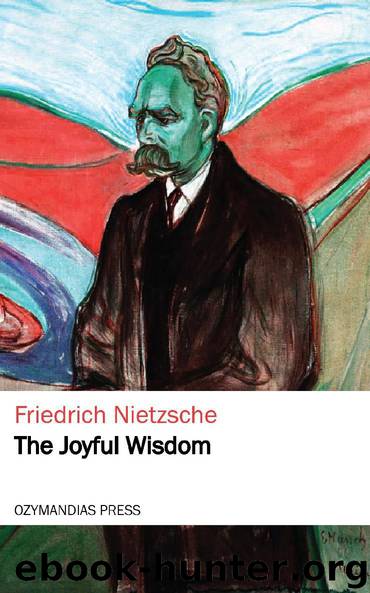The Joyful Wisdom by Friedrich Nietzsche

Author:Friedrich Nietzsche
Language: eng
Format: epub
Publisher: Ozymandias Press
192.
The Good-natured. —What is it that distinguishes the good-natured, whose countenances beam kindness, from other people? They feel quite at ease in presence of a new person, and are quickly enamoured of him; they therefore wish him well; their first opinion is: “He pleases me.” With them there follow in succession the wish to appropriate (they make little scruple about the person’s worth), rapid appropriation, joy in the possession, and actions in favour of the person possessed.
193.
Kant’s Joke. —Kant tried to prove, in a way that dismayed “everybody,” that “everybody” was in the right:—that was his secret joke. He wrote against the learned, in favour of popular prejudice; he wrote, however, for the learned and not for the people.
194.
The “Open-hearted” Man. —That man acts probably always from concealed motives; for he has always communicable motives on his tongue, and almost in his open hand.
195.
Laughable! —See! See! He runs away from men—: they follow him, however, because he runs before them,—they are such a gregarious lot!
196.
The Limits of our Sense of Hearing. —We hear only the questions to which we are capable of finding an answer.
197.
Caution therefore! —There is nothing we are fonder of communicating to others than the seal of secrecy—together with what is under it.
198.
Vexation of the Proud Man. —The proud man is vexed even with those who help him forward: he looks angrily at his carriage-horses.
199.
Liberality. —Liberality is often only a form of timidity in the rich.
200.
Laughing. —To laugh means to love mischief, but with a good conscience.
201.
In Applause. —In applause there is always some kind of noise: even in self-applause.
202.
A Spendthrift. —He has not yet the poverty of the rich man who has counted all his treasure,—he squanders his spirit with the irrationalness of the spendthrift Nature.
203.
Hic niger est.—Usually he has no thoughts,—but in exceptional cases bad thoughts come to him.
204.
Beggars and Courtesy. —"One is not discourteous when one knocks at a door with a stone when the bell-pull is awanting"—so think all beggars and necessitous persons, but no one thinks they are in the right.
205.
Need. —Need is supposed to be the cause of things; but in truth it is often only the result of things.
206.
During the Rain. —It rains, and I think of the poor people who now crowd together with their many cares, which they are unaccustomed to conceal; all of them, therefore, ready and anxious to give pain to one another, and thus provide themselves with a pitiable kind of comfort, even in bad weather. This, this only, is the poverty of the poor!
207.
The Envious Man. —That is an envious man—it is not desirable that he should have children; he would be envious of them, because he can no longer be a child.
208.
A Great Man! —Because a person is “a great man,” we are not authorised to infer that he is a man. Perhaps he is only a boy, or a chameleon of all ages, or a bewitched girl.
209.
A Mode of Asking for Reasons. —There is a mode of asking for our reasons which
Download
This site does not store any files on its server. We only index and link to content provided by other sites. Please contact the content providers to delete copyright contents if any and email us, we'll remove relevant links or contents immediately.
| Ancient, Classical & Medieval | Anthologies |
| British & Irish | Japanese & Haiku |
| Love Poems | Regional & Cultural |
| Themes & Styles | United States |
| Women Authors |
The Universe of Us by Lang Leav(15076)
The Sun and Her Flowers by Rupi Kaur(14517)
Adultolescence by Gabbie Hanna(8927)
Whiskey Words & a Shovel II by r.h. Sin(8017)
Love Her Wild by Atticus(7757)
Smoke & Mirrors by Michael Faudet(6191)
Wiseguy by Nicholas Pileggi(5782)
The Princess Saves Herself in This One by Amanda Lovelace(4975)
Love & Misadventure by Lang Leav(4846)
Memories by Lang Leav(4799)
Milk and Honey by Rupi Kaur(4748)
Bluets by Maggie Nelson(4556)
Too Much and Not the Mood by Durga Chew-Bose(4347)
Pillow Thoughts by Courtney Peppernell(4283)
Good morning to Goodnight by Eleni Kaur(4233)
The Poetry of Pablo Neruda by Pablo Neruda(4106)
Algedonic by r.h. Sin(4062)
HER II by Pierre Alex Jeanty(3611)
Stuff I've Been Feeling Lately by Alicia Cook(3458)
